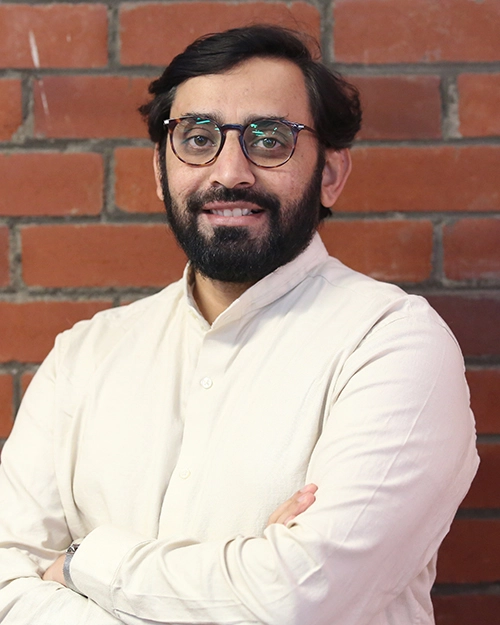
B.A. (St. Philomena’s College, Mysore);
M.A. (Jamia Millia Islamia, Delhi);
M.Phil. (University of Delhi);
Ph.D. (University of Sussex)
Associate Professor
| smfaisal@jgu.edu.in | |
| Connect with me | |
| Key Expertise | Anthropology, Islam in India, Colonialism, Gift and Market, Secularisation and Economy. |
B.A. (St. Philomena’s College, Mysore);
M.A. (Jamia Millia Islamia, Delhi);
M.Phil. (University of Delhi);
Ph.D. (University of Sussex)
Syed Mohammed Faisal received his PhD in Anthropology from University of Sussex. His PhD explored the relationship between religion, kinship, and trade networks on the Konkan coast in South India.
With a training in anthropology as well as Islamic theology, Faisal’s research areas, broadly defined, are anthropology of exchange, ethics, and intellectual history of Islamic traditions in India.
Faisal has also held a postdoctoral fellowship at the International Institute of Information Technology, Bangalore where he investigated the impact of biometric identification systems on community intermediaries in financial sector.
Prior to Jindal School of Liberal Arts and Humanities, Faisal was at the Jindal School of Banking and Finance where he taught courses on anthropology of risk, money and technology.
Key Texts in Sociology and Anthropology (JGU Elective, Spring)
Human beings are assumed to be social creatures. They live in composite shades of cooperation and conflict. Various knowledge corpuses are available to study this human, social condition. Sociology and social anthropology base their very disciplinary identity in explicating the nature and consequences of human social condition. This course takes the student through excerpts of some of the seminal texts in the disciplines of sociology and anthropology, to uncover some important disciplinary lenses. These texts, written across the last two centuries, helped building the basic structure of these disciplines, and helped provide insights into the nature of human interaction to the European and North American cultures. We will read a set of texts that forms a rubric of sociological thought by seminal thinkers and later contrast them with anthropological vantage point and assess their difference in the conceptualisation of human beings. We try to grasp what it means when we use the category of society and social in sociological and anthropological literature.
Society, Space and Culture (BALH Core, Fall)
This course introduces students to three distinct social science disciplines: anthropology, geography and sociology. The first three weeks lay the foundation for distinctive ways of thinking in each of these disciplines. The rest of the course focuses on selected themes, such as globalization, food, religion, arts and digital society that enable students to make connections across social science disciplines. Through a combination of conceptual/theoretical understanding and use of real world examples, the course introduces students to a social-science-based view of the contemporary world. Class discussions will be enlivened and enriched through a range of case-studies, films, cultural and literary texts, as well as a workshop/field trip.
Thesis 1 (BALH Core, Fall)
As the first course in a series of two, this course aims to help students begin the process of research which will lead up to the writing of a capstone thesis in their final semester for graduation. The course will assist students to revise and strengthen the basic elements of an academic research paper by focusing on identifying the structural elements of a research paper including claim and evidence, argument, review of literature, footnotes and sources. Simultaneously the course will facilitate the formulation and elaboration of students’ respective research topics through a combination of workshops, readings, in-class writing and peer review. At the end of this course, the student will have a research problem, articulated clearly in the form of approximately a 10-page long research proposal. The research proposal will entail elements including a research question, an annotated bibliography, a review of relevant literature and a methodology. During the weekly sessions, students will be introduced to the various elements of conducting research which in turn will facilitate the sharpening of their research question. In addition to this, students will also meet their respective subject-expert faculty thrice during the semester to discuss their research project and its viability. Students will also present their research proposal in the class at the end of the semester.
| smfaisal@jgu.edu.in | |
| Key Expertise | Anthropology, Islam in India, Colonialism, Gift and Market, Secularisation and Economy. |